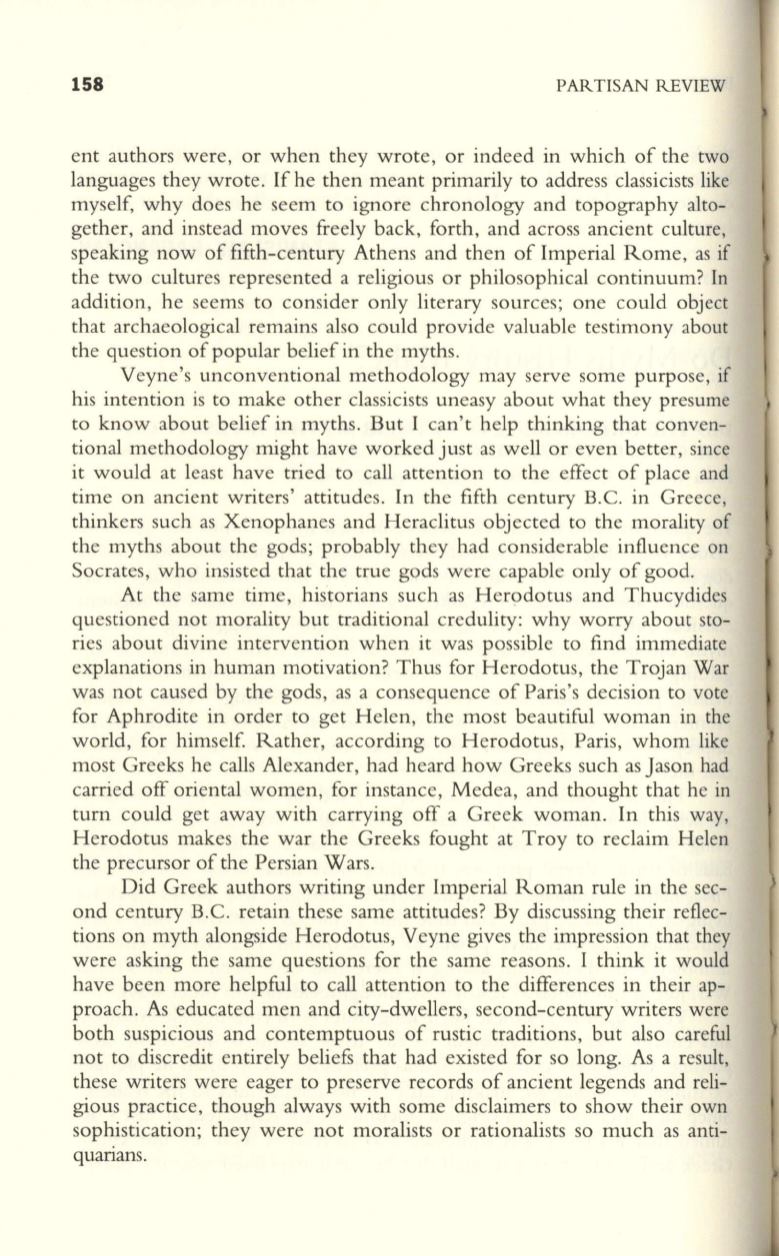
158
p
ARTISAN REVIEW
ent authors were, or when they wrote, or indeed in which of the two
languages they wrote. If he then meant primarily to address classicists like
myself, why does he seem to ignore chronology and topography alto–
gether, and instead moves freely back, forth, and across ancient culture,
speaking now of fifth-century Athens and then of Imperial Rome, as if
the two cultures represented a religious or philosophical continuum? In
addition, he seems to consider only literary sources; one could object
that archaeological remains also could provide valuable testimony about
the question of popular belief in the myths.
Veyne's unconventional methodology may serve some purpose, if
his intention is to make other classicists uneasy about what they presume
to know about belief in myths. But I can't help thinking that conven–
tional methodology might have worked just as well or even better, since
it would at least have tried to call attention to the effect of place and
time on ancient writers' attitudes. In the fifth century B.C. in Greece,
thinkers such as Xenophanes and Heraclitus objected to the morality of
the myths about the gods; probably they had considerable influence on
Socrates, who insisted that the true gods were capable only of good.
At the same time, historians such as Herodotus and Thucydides
questioned not morality but traditional credulity: why worry about sto–
ries about divine intervention when it was possible to find immediate
explanations in human motivation? Thus for Herodotus, the Trojan War
was not caused by the gods, as a consequence of Paris's decision to vote
for Aphrodite in order to get Helen, the most beautiful woman in the
world, for himself. Rather, according to Herodotus, Paris, whom like
most Greeks he calls Alexander, had heard how Greeks such as Jason had
carried off oriental women, for instance, Medea, and thought that he in
turn could get away with carrying off a Greek woman. In this way,
Herodotus makes the war the Greeks fought at Troy to reclaim Helen
the precursor of the Persian Wars.
Did Greek authors writing under Imperial Roman rule in the sec–
ond century B.C. retain these same attitudes? By discussing their reflec–
tions on myth alongside Herodotus, Veyne gives the impression that they
were asking the same questions for the same reasons. I think it would
have been more helpful to call attention to the differences in their ap–
proach. As educated men and city-dwellers, second-century writers were
both suspicious and contemptuous of rustic traditions, but also careful
not to discredit entirely beliefs that had existed for so long. As a result,
these writers were eager to preserve records of ancient legends and reli–
gious practice, though always with some disclaimers to show their own
sophistication; they were not moralists or rationalists so much as anti–
quanans.


